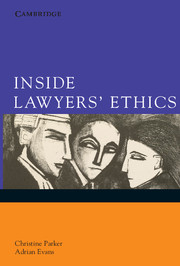Book contents
- Frontmatter
- Contents
- Preface
- Acknowledgments
- List of tables
- List of figures
- List of illustrations
- List of case studies
- Table of statutes
- Table of cases
- 1 Introduction: Values in Practice
- 2 Alternatives to Adversarial Advocacy
- 3 The Responsibility Climate: Regulation of Lawyers' Ethics
- 4 Civil Litigation and Excessive Adversarialism
- 5 Ethics in Criminal Justice: Proof and Truth
- 6 Ethics in Negotiation and Alternative Dispute Resolution
- 7 Conflicting Loyalties
- 8 Lawyers' Fees and Costs: Billing and Over-Charging
- 9 Corporate Lawyers and Corporate Misconduct
- 10 Conclusion – Personal Professionalism: Personal Values and Legal Professionalism
- Index
- References
5 - Ethics in Criminal Justice: Proof and Truth
- Frontmatter
- Contents
- Preface
- Acknowledgments
- List of tables
- List of figures
- List of illustrations
- List of case studies
- Table of statutes
- Table of cases
- 1 Introduction: Values in Practice
- 2 Alternatives to Adversarial Advocacy
- 3 The Responsibility Climate: Regulation of Lawyers' Ethics
- 4 Civil Litigation and Excessive Adversarialism
- 5 Ethics in Criminal Justice: Proof and Truth
- 6 Ethics in Negotiation and Alternative Dispute Resolution
- 7 Conflicting Loyalties
- 8 Lawyers' Fees and Costs: Billing and Over-Charging
- 9 Corporate Lawyers and Corporate Misconduct
- 10 Conclusion – Personal Professionalism: Personal Values and Legal Professionalism
- Index
- References
Summary
Introduction
Television and movies often portray criminal practice as the most glamorous speciality within the legal profession. In fact it is among the least attractive to most new lawyers – probably because defending accused criminals can be seen as repulsive and unremunerative. Yet it is for these very reasons that the criminal defence advocate is usually taken as the paradigmatic example of the reason why adversarial advocacy is necessary and ethically justified. As one senior barrister puts it:
The quality of the system is tested by how it treats the worst … The worst, most revolting criminal or terrorist or whoever it happens to be, if you can get a fair trial for them then everyone else is guaranteed a good run. But if the system starts taking short cuts because somebody is so bad, then it's the system that's coming apart.
Because the potential sanctions for criminal offences, such as deprivation of liberty, are so serious and the resources and capacity of the state to investigate and prosecute crimes so vast, our system assumes that an accused should always have the opportunity to ‘put the Crown to proof’ of any charges brought against the accused. In other words, the strength of the Crown must be able to be put to the test in the adversary system. This effectively holds the state (including the police and other regulators) accountable by making sure that they have strong enough evidence to justify conviction and imprisonment.
- Type
- Chapter
- Information
- Inside Lawyers' Ethics , pp. 96 - 119Publisher: Cambridge University PressPrint publication year: 2007



